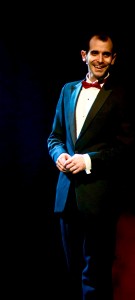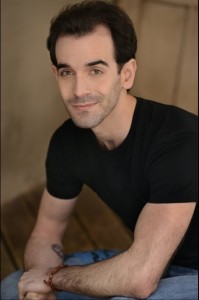Phindie’s first interview, Theater from the Inside Out: Interview with JP Dunphy, multitalented DOGFIGHT actor, singer, and dancer, concentrated on Dunphy’s personal life and theater career in Philadelphia. Part two details his preparations as an actor for a wide range of demanding roles and ends on a surprise invitation. [Media Theatre, 104 E State Street, Media, PA] March 9-27, 2016; mediatheatre.org.

Eger: You just performed in multiple roles in Media Theatre’s production of Dogfight, a thought-provoking musical that handles a difficult subject—the lives of Marines before, during, and after the Vietnam War. Neither the music nor the lyrics are easy, and yet, the whole ensemble pulled it off. Tell us more about working with your colleagues on this challenging production.
Dunphy: The talent and voices of this group were beyond what you normally find in a group of actors. This crew not only bonded on a personal level with each other, but also demonstrated the famous Trifecta—Singing, Acting, and Dancing—at the highest level. It’s not easy to hold the tough harmonies, keep your acting up, AND move at the same time. The actors here have proven that running across stage and holding a high B is not only doable but repeatable seven times a week.
Eger: How did you prepare for the role as a Marine?
Dunphy: I went to a few of my Marine friends and asked them to teach me and fix what I might be doing wrong—from mannerisms of the Sergeant, to the proper way to salute and stand at attention and at ease. Another big preparation I did for my Marine portrayal was extensive Rucking (running with weights in a rucksack)— Rucking, like acting, is an art. I worked with ex-special forces in a training regimen known as the GoRuck Challenge: 10-12 hours, 15-25 miles, with a 94% completion rate. All activities and exercises were done with 30 lbs of weight on our backs, as well as rotating team weights of 20, 30, and 45 lbs. While I didn’t train with my cast mates, rucksacking got me into the best shape of my life.

Eger: You were superb as an arrogant waiter at an expensive restaurant who didn’t want an explosive Marine and his girlfriend to have dinner. What did you do to prepare for this role?
Dunphy: I’ve actually gone through a couple versions of this guy: soft, with a light tremor when scared, and eventually, the version you see today. Admittedly, I looked for the original player of this role [in the 1991 film] and his version of it to get a better idea.
Eger: You also played the exact opposite, a rough, couldn’t-care-less tattoo artist in San Francisco who was more interested in smoking whatever he was inhaling than in doing artistic designs for his clients. Yet, you pulled that off, too. Again, what did you do to prepare for this role?
Dunphy: Within 20 seconds, I changed from the elegant waiter to a rough, chain-smoking tattoo artist—channeling my first ever tattoo artist, who was bald, overweight, and even gruffer. My sharp-tempered artist with a sharp object just seemed to be the best way to do the character. I quickly threw some water in my hair and slicked it back, giving myself a balding, sweaty, piece-of-shit style look that made the tattoo artist even more of a tough bastard than the arrogant waiter.
Eger: One of your greatest strengths is your dancing and, sure enough, you were given the role of the lead dancer and MC. Where did you study dance, and how much training has gone into your work?
Dunphy: I studied dance through college, mostly Fosse, Jazz, and Tap at DeSales University for undergrad work. More recently, I studied with Maggie Anderson at Temple University. I believe some of the more classical training aspects of that class really brought me up from a mover to an actual dancer.
Eger: Share one thing with us that only your best friends know about you.
Dunphy: In addition to acting, I have a big dream to start a Tiny House community, completely off-grid, that traveling actors can stay at for practically free, or live there with long-term leases. My Tiny House community would be open not only to actors, but musicians and artists the world over. I love tiny houses, and actors are known for living out of backpacks for weeks on end. The concept of having a place always open to theater artists that wouldn’t cost a cent past the initial start-up seems like a massive game-changer for any actor or professional traveling. Eventually, I would like to have bases here, in Boston, New York, LA, and San Francisco.
Eger: What an extraordinary idea. More concretely, what are your next plans, professionally speaking?
Dunphy: I’m still working with Jeff Coon and Fran Prisco to broaden the Summer Club shows in Cape May, NJ, with well-known American theater artists who join our team for specific performances. We want to update the show in such a way that members of every generation will come and enjoy the showmanship and pure talent on stage. I’m looking into other theaters as well to expand my professional theatre base.

Eger: Great. Keep up acting, dancing, and singing, putting the fight in Dogfight, together with an outstanding cast under the direction of Jesse Cline and choreography by Dann Dunn. Who knows, your famous father might encourage his Temple University basketball players to watch the Marines in Dogfight and become even stronger athletes.
[Media Theatre, 104 E State Street, Media, PA] March 9-27, 2016; mediatheatre.org.
